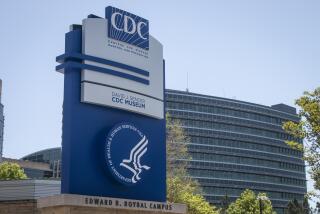Medi-Cal Cuts Expected to Impede Treatment : Experts See Fewer Doctors in Program, More Pressure on County Facilities
- Share via
Medi-Cal patients may find it more difficult to get outpatient treatment for their ailments after a 10% cut in some Medi-Cal payments ordered by the Deukmejian Administration goes into effect Feb. 1, medical leaders say.
Not only is the number of private physicians willing to see Medi-Cal patients expected to dwindle as a result of the cut in their fees, but the patient load at already overburdened county outpatient facilities is likely to increase, according to health authorities.
State Budget Shortfall
The 10% cut in payment for services applies to physicians, dentists, hospital outpatient departments and a number of other health professionals who serve the state’s 3 million Medi-Cal patients. The Deukmejian Administration said last month that it is making the cuts in order to help counterbalance a projected $900-million state budget shortfall, $280.7 million of which will be for Medi-Cal services.
While the cut in fees to medical providers is expected to save only $18.7 million--minuscule compared to the program’s $5 billion budget--some medical leaders see it as adding one more barrier to adequate health care for people who are finding it increasingly difficult to locate doctors willing to treat Medi-Cal patients.
How severe the upcoming 10% cuts will prove to be may depend on how many private doctors who treat Medi-Cal patients phase out of the program, said Irv Cohen, assistant director for finance for the Los Angeles County Department of Health Services. The department operates health facilities that serve about 18,000 patients who will be affected by the cutback.
Cohen said the county will continue to provide Medi-Cal patients the same services that it currently does, despite an expected $800,000 loss in revenues between February and June 30. But, he said, the waiting time at county facilities could increase significantly if many private physicians quit the program and their patients show up at county facilities.
Impact Predicted
According to Dr. Jack McCleary, president of the Los Angeles County Medical Assn., “The eventual impact of the 10% cut will be to reduce the availability of doctors to take care of Medi-Cal patients.”
“The need for care will not go away,” he said. “The burden will be on the county. If more doctors quit, hospitals may see sicker patients because more people will put off seeking care in the early stages of an illness.”
The problem is similar statewide, according to Dr. Gladden Elliott, president of the California Medical Assn.
“The availability (of doctors) over a wide geographical area will be spotty,” he said.
Citing high blood pressure as an ailment that is easy for patients to ignore because they do not feel ill, Dr. Clyde Oden, president of the Watts Health Foundation, said delaying care could likely lead to a stroke or other medical problems that would end up costing the Medi-Cal program far more than an outpatient visit. Charges for inpatient hospital services are among those exempted from the 10% rate reduction. Among other exempt providers are nursing homes, rural health clinics, state-county mental health programs and obstetricians.
Children under 14 years of age are expected to be especially vulnerable if more dentists quit the program because of the fee cutback. Children make up one-third of all Medi-Cal beneficiaries. According to a California Dental Assn. spokeswoman, “fewer and fewer dentists are willing to treat Medi-Cal patients” because the program now pays about 40% of regular dental fees and most counties have no dental programs for patients to fall back on.
Impact on Specialists
Medical specialists, such as orthopedists, will also be further discouraged from participating in the program, predicted Dr. Gary Krieger, a San Pedro pediatrician. “There is no orthopedist in San Pedro who will see a Medi-Cal patient,” he said.
In Orange County, which has no public hospital to serve as a last resort for patients if more private physicians quit Medi-Cal, the problem is becoming “enormous,” said Dr. Howard Waitzkin, professor of medicine and social sciences at University of California, Irvine, Medical Center.
“The bottom line is that any further cutbacks by the state will exacerbate the problem,” he said.
More to Read
Sign up for Essential California
The most important California stories and recommendations in your inbox every morning.
You may occasionally receive promotional content from the Los Angeles Times.





![Vista, California-Apri 2, 2025-Hours after undergoing dental surgery a 9-year-old girl was found unresponsive in her home, officials are investigating what caused her death. On March 18, Silvanna Moreno was placed under anesthesia for a dental surgery at Dreamtime Dentistry, a dental facility that "strive[s] to be the premier office for sedation dentistry in Vitsa, CA. (Google Maps)](https://ca-times.brightspotcdn.com/dims4/default/07a58b2/2147483647/strip/true/crop/2016x1344+29+0/resize/840x560!/quality/75/?url=https%3A%2F%2Fcalifornia-times-brightspot.s3.amazonaws.com%2F78%2Ffd%2F9bbf9b62489fa209f9c67df2e472%2Fla-me-dreamtime-dentist-01.jpg)







